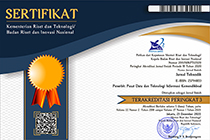EVALUASI PEMBELAJARAN BERBASIS WEBINAR DENGAN IMPORTANCE PERFORMANCE MATRIX ANALYSIS (IPMA)
The Evaluation of Webinar-Based Learning with Importance Performance Matrix Analysis (IPMA)
DOI:
https://doi.org/10.32550/teknodik.vi.790Keywords:
webinar, learning management system, servqual, IPMA, pembelajaranAbstract
Evaluasi kegiatan webinar dilakukan Pusdiklat Perdagangan untuk mengetahui aspek-aspek yang perlu diperbaiki untuk memberikan kualitas pelayanan yang terbaik. Evaluasi dilakukan terhadap peserta webinar. Sampel diambil dengan non probability sampling, yaitu purposive sampling yang berjumlah 36 responden dengan menggunakan kuesioner melalui survei online. Evaluasi layanan dilakukan dengan pendekatan service quality (servqual) terhadap empat dimensi pelaksanaan webinar, yaitu promosi, pelaksana, narasumber, dan materi. Hasil analisis dengan pendekatan importance performance matrix analysis (IPMA) membagi dimensi dan indikator ke dalam empat kuadran. Hasil menunjukkan bahwa narasumber dan materi adalah dua dimensi yang mempunyai tingkat kepentingan tinggi dan kinerja yang baik, yaitu berada pada kuadran 2; dimensi promosi telah mempunyai kinerja yang sangat baik meski tidak mempunyai kepen tingan yang tinggi ; sedangkan dimensi pelaksana/pelaksanaan menjadi dimensi yang harus diperbaiki karena memiliki tingkat kepentingan yang tinggi, tetapi kinerja yang rendah. Temuan lain yang harus diperbaiki dalam pelaksanaan webinar adalah peran pemandu acara yang harus aktif memahami dan memenuhi kebutuhan peserta selama kegiatan webinar berlangsung . Oleh karena itu, dalam penyelenggaraan webinar, penyelenggara harus dapat memilih dan mempersiapkan pemandu acara yang memahami materi, karakter peserta, dan kebutuhan peserta webinar
The evaluation of the webinar activity was carried out by the Trade Training Center to determine the aspects that needed to be improved in order to provide the best quality service. The evaluation was carried out on the participants of the webinar where the sample was taken by non-probability sampling, namely purposive sampling involving 36 respondents using a questionnaire through an online survey. The evaluation was carried out using a service quality (servqual) approach to the 4 dimensions of the webinar implementation, namely promotion, implementer, resource person, and material. The results of the analysis using the important performance matrix analysis (IPMA) approach divide the dimensions and indicators into 4 quadrants. The results show that resource persons and materials are two dimensions that have good importance and performance, namely being in quadrant 2, the promotion dimension has a very good performance even though it does not have a high importance, while the implementation/implementation dimension is a dimension that must be improved because it has a high level of importance but low performance. The most important thing that must be improved in implementing the webinar is the role of the host who must understand and meet the needs of the participants during the webinar activity, so that in organizing the webinar, the organizer must select and prepare a host who understands the material, the character of the participants, and the needs of the webinar participants.
References
Afify, M. K. (2018). The effect of the difference between infographic designing types (static vs animated) on developing visual learning designing skills and recognition of its elements and principles. International Journal of Emerging Technologies in Learning, 13(9), 204–223. https://doi.org/10.3991/ijet.v13i09.8541
Afthanorhan, A., Awang, Z., Rashid, N., Foziah, H., & Ghazali, P. L. (2019). Assessing the effects of service quality on customer satisfaction. Management Science Letters, 9(1), 13–24. https://doi.org/10.5267/j.msl.2018.11.004
Ali, F., Hussain, K., Konar, R., & Jeon, H. M. (2017). The Effect of Technical and Functional Quality on Guests’ Perceived Hotel Service Quality and Satisfaction: A SEM-PLS Analysis. Journal of Quality Assurance in Hospitality and Tourism, 18(3), 354–378. https://doi.org/10.1080/1528008X.2016.1230037
Carrick, F. R., Abdulrahman, M., Hankir, A., Zayaruzny, M., Najem, K., Lungchukiet, P., & Edwards, R. A. (2017). Randomized controlled study of a remote flipped classroom neuro-otology curriculum. Frontiers in Neurology, 8(JUL). https://doi.org/10.3389/fneur.2017.00349
Gegenfurtner, A., & Ebner, C. (2019). Webinars in higher education and professional training: A meta-analysis and systematic review of randomized controlled trials. In Educational Research Review (Vol. 28). Elsevier Ltd. https://doi.org/10.1016/j.edurev.2019.100293
Haming, M., Murdifin, I., Zulfikar Syaiful, A., & Putra, A. H. P. K. (2019). The application of SERVQUAL distribution in measuring customer satisfaction of retails company. Journal of Distribution Science, 17(2), 25–31. https://doi.org/10.15722/jds.17.02.201902.25
Henseler, J., Ringle, C. M., & Sarstedt, M. (2015). A new criterion for assessing discriminant validity in variance-based structural equation modeling. Journal of the Academy of Marketing Science, 43(1), 115–135. https://doi.org/10.1007/s11747-014-0403-8
Hwa, C. J., Chuah, F., & Ting, H. (2017). PLS-SEM using SmartPLS 3.0: Chapter 13: Assessment of Moderation Analysis. https://www.researchgate.net/publication/341357609
Joseph F. Hair, G. T. M. H. C. M. R. M. S. (2013). A Primer on Partial Least Squares Structural Equation Modeling (PLS-SEM). SAGE Publications.
Kwong, K., & Wong, K. (2013). Partial least square structural equation modeling (PLS-SEM) techniques using SmartPLS. https://www.researchgate.net/publication/268449353
Minta, N. K., & Stephen, O. (2017). Importance-Performance Matrix Analysis (IPMA) of Service Quality and Customer Satisfaction in the Ghanaian Banking Industry. International Journal of Academic Research in Business and Social Sciences, 7(7). https://doi.org/10.6007/ijarbss/v7-i7/3120
Naser Alolayyan, M., Ibraheem Shelash Al-Hawary, S., Abraheem Shlash Mohammad, A., & Abdul-Hafez Attallah Al-Nady, B. (2018). Banking service quality provided by commercial banks and customer satisfaction. A structural equation modelling approaches. In Int. J. Productivity and Quality Management (Vol. 24, Issue 4).
Nunkoo, R., Teeroovengadum, V., Thomas, P., & Leonard, L. (2017). Integrating service quality as a second-order factor in a customer satisfaction and loyalty model. International Journal of Contemporary Hospitality Management, 29(12), 2978–3005. https://doi.org/10.1108/IJCHM-11-2016-0610
Rauch, D. A., Collins, M. D., Nale, R. D., & Barr, P. B. (2015). Measuring service quality in mid-scale hotels. International Journal of Contemporary Hospitality Management, 27(1), 87–106. https://doi.org/10.1108/IJCHM-06-2013-0254
Raza, S. A., Umer, A., Qureshi, M. A., & Dahri, A. S. (2020). Internet banking service quality, e-customer satisfaction and loyalty: the modified e-SERVQUAL model. TQM Journal, 32(6), 1443–1466. https://doi.org/10.1108/TQM-02-2020-0019
Soares, M. C., Novaski, O., & Anholon, R. (2017). SERVQUAL model applied to higher education public administrative services. Brazilian Journal of Operations & Production Management, 14(3), 338–349. https://doi.org/10.14488/bjopm.2017.v14.n3.a7
Tamwatin, U., Trimetsoontorn, J., & Fongsuwan, W. (2015). Ensuring customer satisfaction through service quality and image management in the hospitality industry: A conceptual perspective. Journal for Global Business Advancement, 8(1), 59–83. https://doi.org/10.1504/JGBA.2015.067270
Taplin, R. (2012). Competitive importance-performance analysis of an Australian wildlife park. Tourism Management, 33, 29–37. Https://Doi.Org/10.1016/J.Tourman.2011.01.020
Waldopo. (2014). Evaluasi Terhadap Layanan Ppdb Online Di Kota Pekanbaru Evaluation Of Online Admission Application System For New Students (Ppdb Online) In Pekanbaru City. https://jurnalteknodik.kemdikbud.go.id/index.php/jurnalteknodik/article/view/107
Downloads
Published
How to Cite
Issue
Section
Citation Check
License
Copyright (c) 2022 Jurnal Teknodik

This work is licensed under a Creative Commons Attribution-NonCommercial-ShareAlike 4.0 International License.
Please download and complete the Form, Copyright Transfer, and Ethics Statement Form. The following is provided at the time of submitting the text (Upload Additional Files):










